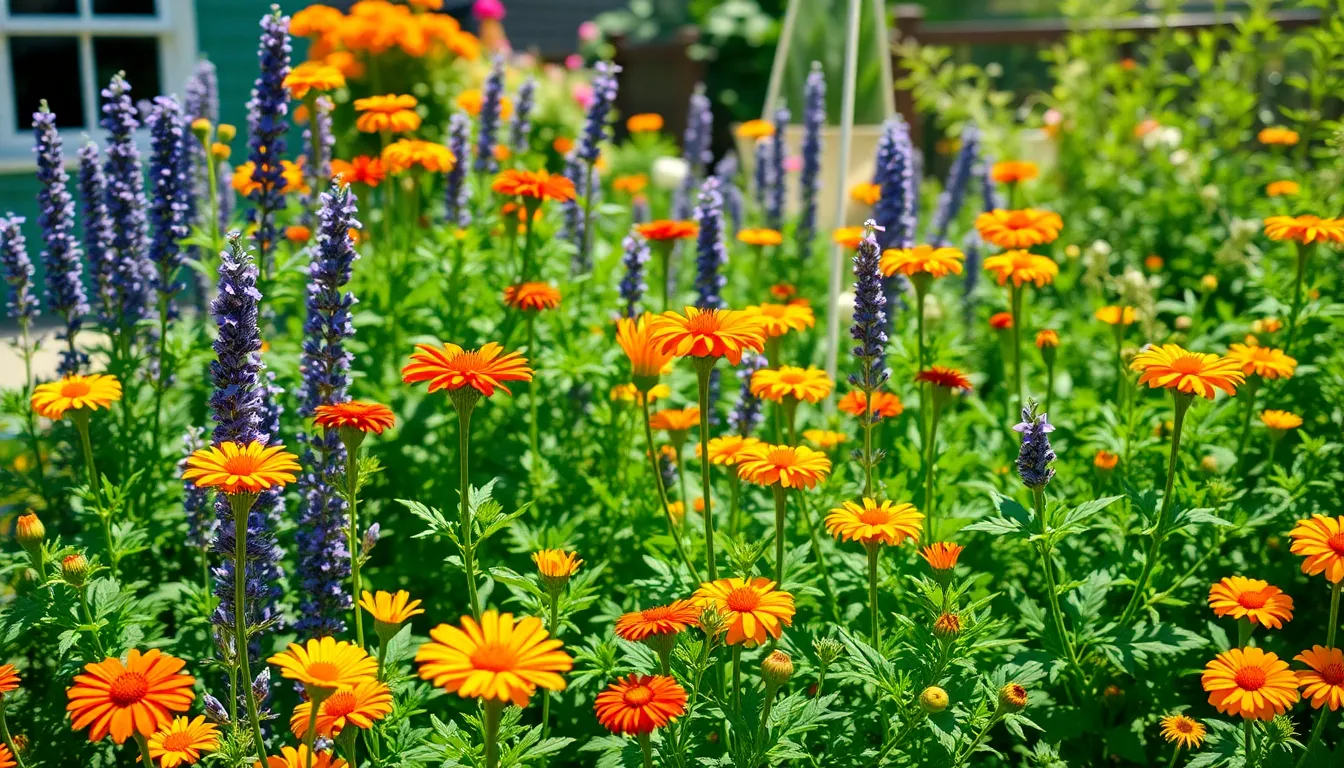Summer’s here and so are the pesky mosquitoes, ready to turn your backyard barbecue into a buffet. But what if there was a way to keep these bloodsuckers at bay without dousing yourself in chemical-laden sprays? Enter the world of mosquito-repellent plants. Not only do these green guardians add beauty to your garden, but they also pack a punch against those annoying little critters.
Imagine sipping lemonade on your patio, surrounded by vibrant herbs and flowers that smell great and keep mosquitoes away. From the aromatic scent of citronella to the spicy allure of basil, these plants are nature’s way of saying, “Not today, mosquitoes!” Dive into the fascinating realm of mosquito-repellent plants and discover how to create a pest-free oasis right in your own backyard.
Table of Contents
ToggleOverview of Mosquito-Repellent Plants
Mosquito-repellent plants offer a natural method to reduce mosquito presence in gardens and outdoor spaces. Citronella grass is particularly renowned for its strong, aromatic properties that deter many types of mosquitoes. This plant thrives in warm climates and can grow up to 5-6 feet tall.
Basil, a popular culinary herb, also serves as an effective mosquito repellent. Its essential oil contains compounds that repel pests, making it suitable for gardens and kitchens alike. Lavender, with its pleasant fragrance, not only attracts pollinators but also repels mosquitoes and other insects.
Marigolds are vibrant flowers that contain compounds known as pyrethrum, which naturally repel mosquitoes. These plants add color to gardens while providing pest control benefits. Additionally, catnip has shown effectiveness against mosquitoes due to its high concentration of nepetalactone, a natural deterrent.
Incorporating these plants into landscaping creates attractive barriers that limit mosquito activity. Rosemary, often used in cooking, also possesses repelling qualities due to its strong scent. Creating a diverse planting area with mosquito-repellent species enhances the overall protection against these pests.
Using mosquito-repellent plants not only promotes eco-friendly practices but also adds beauty and functionality to outdoor spaces. Exploring local nurseries provides access to a variety of these plants, allowing gardeners to choose the best options for their specific environments.
Types of Mosquito-Repellent Plants

Understanding mosquito-repellent plants can help enhance outdoor living spaces. These plants offer not only aesthetic appeal but also effective pest control.
Citronella
Citronella grass stands out for its strong scent that effectively keeps mosquitoes away. Growing well in warm climates, this perennial grass is commonly used in many pest-repellent products. It’s important to position citronella plants in sunny spots for optimal growth. Adding them to patios and outdoor seating areas provides natural protection while creating a pleasant atmosphere.
Lavender
Lavender is not only prized for its beauty but also for its ability to repel mosquitoes. Its fragrant flowers attract beneficial pollinators while keeping pests at bay. Planting lavender in well-drained soil and sunny locations ensures vibrant blossoms. This herb can also be harvested for sachets or essential oils, adding further value to gardens.
Marigold
Marigolds contain pyrethrum, a natural compound that repels mosquitoes and other garden pests. These colorful flowers brighten landscapes and deter unwanted insects with their scent. Planting marigolds in borders or mixed flower beds offers dual benefits of decoration and pest control. Frequent deadheading promotes blooming, enhancing their effectiveness over the growing season.
Basil
Basil is a versatile herb that does more than enhance culinary dishes. This aromatic plant emits oils that repel mosquitoes effectively. Growing basil in pots or garden beds allows easy access for cooking while keeping pests away. Regular pruning encourages bushy growth, maximizing mosquito-repellent properties in outdoor areas.
How Mosquito-Repellent Plants Work
Mosquito-repellent plants utilize naturally occurring oils and compounds to deter pests effectively.
Natural Oils and Compounds
Plants like citronella, basil, and lavender produce essential oils that repel mosquitoes. Citronella contains a high concentration of geraniol, while basil’s oil includes eugenol, both known for their repellent properties. Lavender’s scent, appealing to humans, acts as a barrier to mosquitoes. These natural compounds disrupt mosquito sensory perception, making it challenging for them to locate potential hosts. Instead of relying on artificial repellents, choosing plants that have these oils provides a sustainable and eco-friendly solution for maintaining outdoor spaces.
Attracting Beneficial Insects
Incorporating mosquito-repellent plants helps attract beneficial insects such as ladybugs and lacewings. These insects prey on mosquito larvae, reducing their population naturally. Moreover, flowering plants like marigolds lure pollinators, enhancing garden biodiversity. While the primary purpose centers on repelling mosquitoes, creating an ecosystem balance is equally important. With healthy plants in gardens, a flourishing habitat supports both pest management and plant health, resulting in vibrant outdoor areas.
Benefits of Using Mosquito-Repellent Plants
Using mosquito-repellent plants provides numerous advantages that extend beyond their pest-repelling properties. These plants offer a natural and effective alternative to chemical solutions, enhancing outdoor spaces while promoting environmental health.
Chemical-Free Alternatives
Opting for mosquito-repellent plants eliminates the need for harmful chemicals. Many conventional insect repellents contain synthetic ingredients that may have adverse effects on health and the environment. Choosing plants like citronella and basil ensures a safer outdoor experience for families and pets. These plants release natural oils that disrupt mosquito behavior without posing risks associated with chemical pesticides. Incorporating plant-based solutions promotes a healthier ecosystem and supports practices aligned with sustainable gardening.
Aesthetic Appeal
Incorporating mosquito-repellent plants enhances the visual appeal of gardens and landscapes. Lavender, marigolds, and basil add vibrant colors and textures while serving their dual purpose of pest control. These plants create inviting spaces for relaxation and enjoyment. Gardeners can combine these plants into existing landscapes for additional beauty. Furthermore, cultivating a variety of these specimens attracts beneficial insects, nurturing a thriving environment. A carefully chosen selection of mosquito-repellent plants transforms ordinary gardens into stunning, functional spaces.
Embracing mosquito-repellent plants offers a natural solution for enjoying outdoor spaces without the annoyance of pests. By incorporating varieties like citronella, basil, and lavender, gardeners can create vibrant landscapes that not only deter mosquitoes but also enhance biodiversity. These plants provide a chemical-free alternative that prioritizes safety for families and pets while adding beauty to any garden.
Exploring local nurseries for these effective plants can transform ordinary backyards into inviting retreats. As summer approaches, it’s time to consider these eco-friendly options and cultivate an outdoor environment that’s both pleasant and pest-free. With the right plants, outdoor activities can be enjoyed to the fullest without the interference of mosquitoes.


